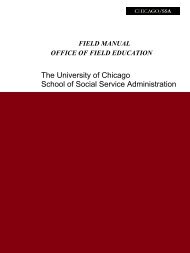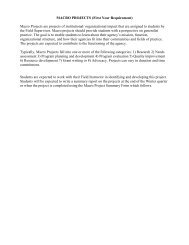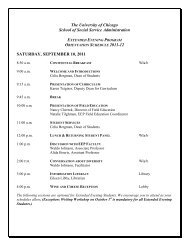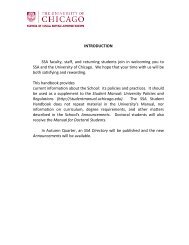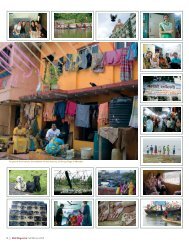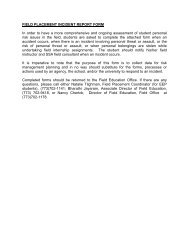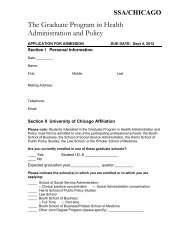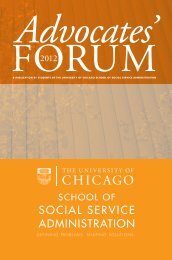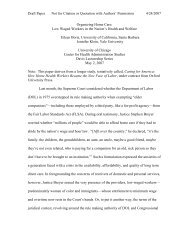2004 - School of Social Service Administration - University of Chicago
2004 - School of Social Service Administration - University of Chicago
2004 - School of Social Service Administration - University of Chicago
Create successful ePaper yourself
Turn your PDF publications into a flip-book with our unique Google optimized e-Paper software.
Advocates’ Forum<br />
her daughter. In church and at other community activities, when Adrian’s<br />
mother’s name was mentioned, it was more <strong>of</strong> a way to remember her important<br />
place in Adrian’s life than as a means <strong>of</strong> degrading her mother’s value<br />
(personal communication, March 9, 2001). This method <strong>of</strong> identifying with<br />
her mother helped Adrian to develop positive esteem and to cope with her<br />
mother’s incarceration. Although Adrian still sought counseling to deal with<br />
her mother’s absence, she was supported throughout the process. The familial<br />
nature <strong>of</strong> these interactions allowed Adrian to thrive in spite <strong>of</strong> her mother’s<br />
incarceration. Such a nurturing environment is ideal, but not all children have<br />
that good fortune.<br />
In the event <strong>of</strong> parental incarceration, if children cannot be placed with a<br />
suitable and stable relative, children enter the foster care system. “Unlike most<br />
children who enter child protective services system due to parental neglect,<br />
children <strong>of</strong> arrested parents become dependents <strong>of</strong> the juvenile court and are<br />
subsequently placed in foster care if no relative is available” (Reed, 1997, p.<br />
155). “Fundamentally, the kids are punished along with the mother as they are<br />
shuttled through an odyssey <strong>of</strong> makeshift care arrangements, separated from<br />
siblings, yanked out <strong>of</strong> schools, and left alone to struggle with the turmoil <strong>of</strong><br />
disrupted lives” (Huie, 1993, p. 2). However, whether placed in foster care or<br />
with relatives, they will experience adversity. The school, community, and<br />
even family members can have far-reaching effects on the child’s development.<br />
THE ROLE OF SOCIAL WORK<br />
IN PROMOTING CHANGE<br />
<strong>Social</strong> workers can play an important role in addressing the dilemmas faced by<br />
the children <strong>of</strong> incarcerated mothers. In the schools, social workers can promote<br />
sensitive environments where counseling opportunities can facilitate a<br />
child’s healing. In discussing students’ unique concerns, social workers can<br />
tailor intervention approaches to meet the needs <strong>of</strong> this special population.<br />
The dilemmas <strong>of</strong> these children should be addressed differently from those <strong>of</strong><br />
a child suffering from divorce or the death <strong>of</strong> a parent. <strong>School</strong> social workers<br />
should also serve as a resource, connecting the child with appropriate services<br />
in the community. In addition, social workers can also facilitate awareness <strong>of</strong><br />
these issues among other school staff, such as teachers, counselors, administrators,<br />
and other students.<br />
As greater numbers <strong>of</strong> economically disadvantaged parents experience<br />
incarceration (Watterson, 1996), it is important to increase the dialogue concerning<br />
the many issues that contribute to disadvantage and incarceration.<br />
58



